Women athletes often struggle with mental fatigue due to societal pressures and performance expectations. Self-help books designed for them provide strategies for managing stress, enhancing recovery, and building resilience. Key approaches include mindfulness practices, cognitive behavioural techniques, and goal-setting methods. These resources empower female athletes to improve their mental well-being and optimise their performance.
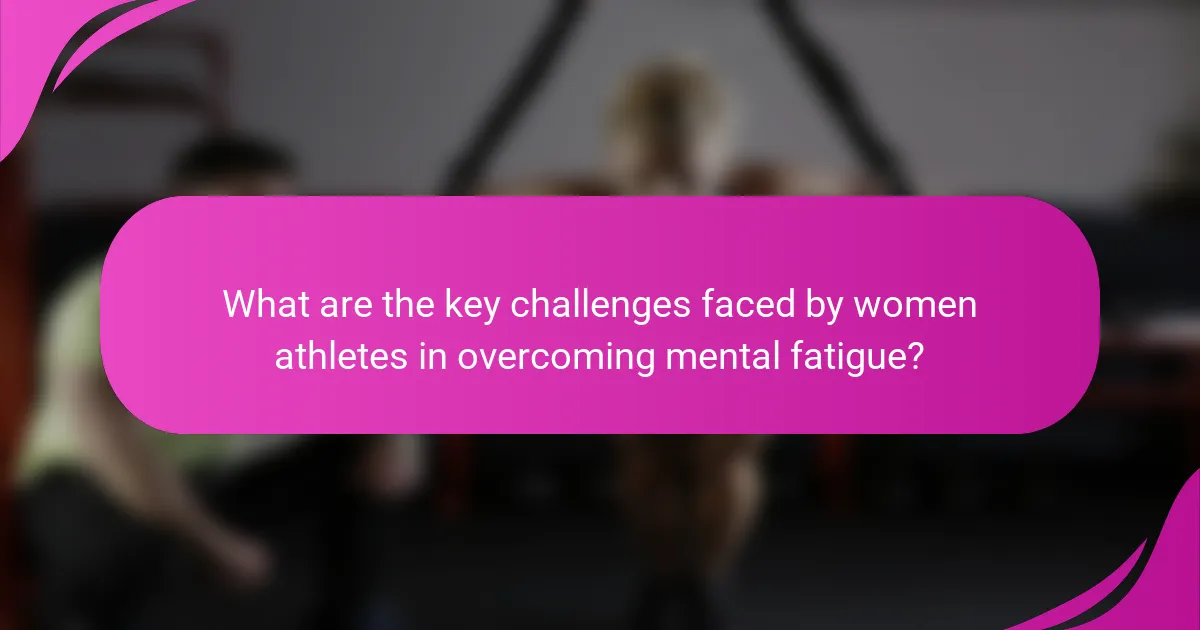
What are the key challenges faced by women athletes in overcoming mental fatigue?
Women athletes face significant challenges in overcoming mental fatigue, including societal pressures, performance expectations, and lack of support. These factors can lead to increased stress and anxiety, ultimately affecting their performance and recovery. Self-help books tailored for women athletes often provide strategies to manage mental fatigue, focusing on mindfulness, resilience, and effective recovery techniques. For example, incorporating mental exercises and developing a strong support network can enhance overall well-being. Addressing these challenges is crucial for optimal performance and long-term success.
How does mental fatigue specifically affect female athletes’ performance?
Mental fatigue significantly hinders female athletes’ performance by reducing focus, motivation, and decision-making abilities. This can lead to decreased training effectiveness and increased risk of injury. Research indicates that mental fatigue can impair physical performance by as much as 20%. Implementing self-help strategies from targeted books can enhance recovery and resilience against mental fatigue. These resources often provide practical techniques for stress management, mindfulness, and positive self-talk, which are essential for maintaining peak performance.
What role does gender play in the experience of mental fatigue?
Gender significantly influences the experience of mental fatigue in women athletes. Research indicates that women often report higher levels of mental fatigue compared to their male counterparts, partly due to societal expectations and stressors. Women may face unique challenges, such as balancing athletic commitments with family responsibilities, which can exacerbate mental fatigue. Additionally, hormonal fluctuations throughout the menstrual cycle can impact energy levels and recovery, further complicating the mental fatigue experience. Understanding these gender-specific factors is crucial for developing effective self-help strategies in mental recovery for women athletes.
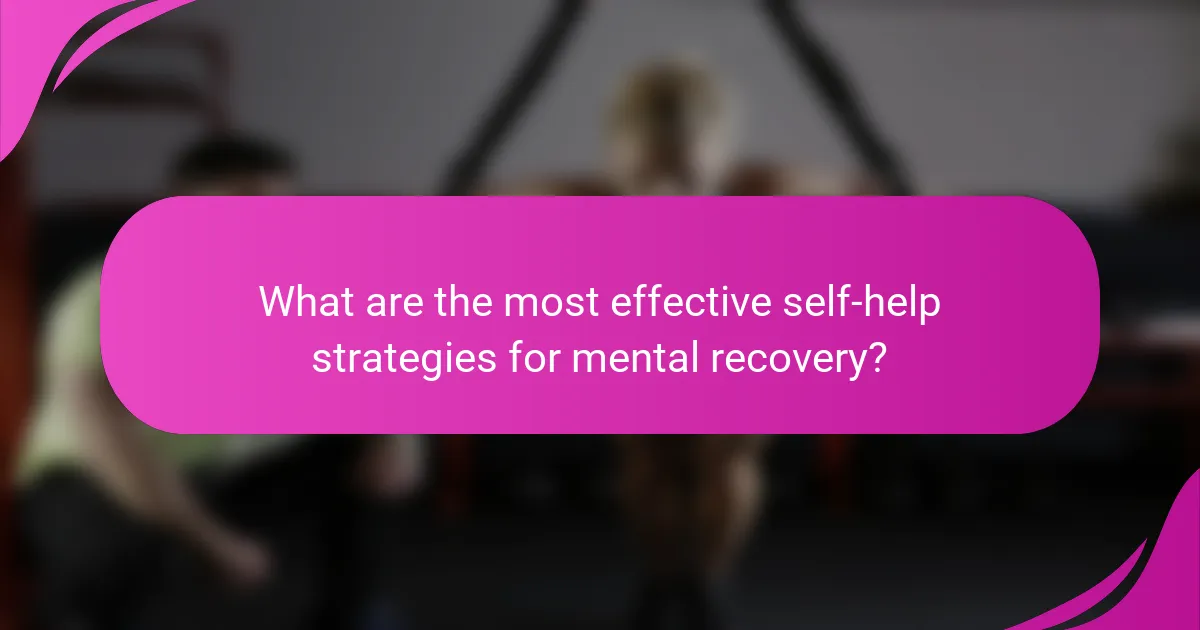
What are the most effective self-help strategies for mental recovery?
Self-help strategies for mental recovery effectively include mindfulness practices, cognitive behavioural techniques, and goal-setting methods. These approaches enhance resilience and promote mental well-being.
Mindfulness practices, such as meditation and breathing exercises, help reduce stress and improve focus. Cognitive behavioural techniques assist in reframing negative thoughts and developing a positive mindset. Goal-setting methods encourage women athletes to establish clear recovery objectives, enhancing motivation and accountability.
Incorporating these strategies into daily routines leads to improved mental health outcomes. Research indicates that women athletes who engage in structured self-help practices experience reduced mental fatigue and enhanced recovery rates.
How can self-help books provide practical techniques for recovery?
Self-help books can offer practical techniques for recovery by providing actionable strategies tailored for women athletes. These books often focus on mental fatigue, emphasizing mindfulness practices, visualization techniques, and cognitive restructuring to enhance recovery. For instance, techniques like journaling can help track emotions and performance, fostering a deeper understanding of personal challenges. Additionally, many self-help books include exercises designed to build resilience, which can be crucial for overcoming setbacks. By integrating these practical tools, women athletes can improve their mental well-being and optimise their recovery processes.
What are the benefits of mindfulness and visualization techniques?
Mindfulness and visualization techniques enhance mental resilience and recovery for women athletes. They reduce stress, improve focus, and boost performance. Practicing mindfulness fosters self-awareness, while visualization creates a mental blueprint for success. Together, these techniques combat mental fatigue, leading to quicker recovery and improved overall well-being.
How can journaling aid in mental recovery?
Journaling can significantly aid in mental recovery by providing a structured outlet for emotions. It allows women athletes to process experiences, reducing mental fatigue and enhancing clarity. Regular journaling fosters self-reflection, which is crucial for identifying stressors and coping strategies. Studies indicate that expressive writing can improve mood and decrease anxiety, making it a unique tool for mental resilience.
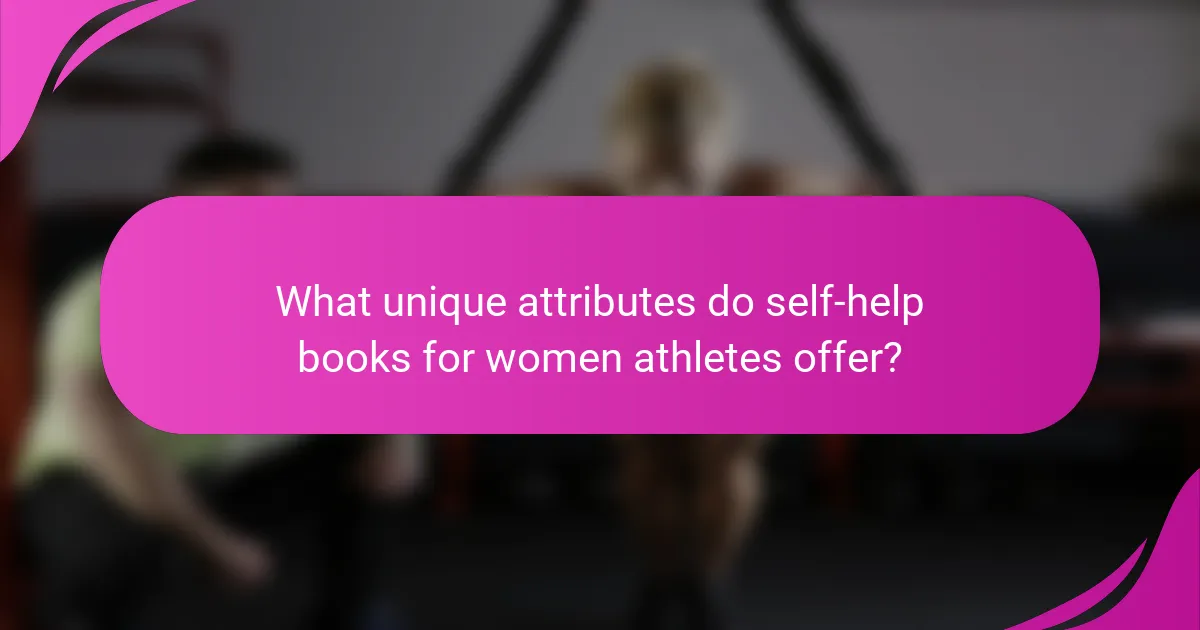
What unique attributes do self-help books for women athletes offer?
Self-help books for women athletes uniquely address mental fatigue and recovery through tailored strategies and inspiration. These books often emphasise resilience, self-compassion, and specific coping techniques. They provide insights into overcoming gender-specific challenges in sports, fostering a sense of community among female athletes. Additionally, they may include practical exercises for mindfulness and visualization, enhancing both mental and physical performance.
Which authors are considered authorities in this niche?
Prominent authors in self-help for women athletes include Dr. Joan Vickers, renowned for her work on mental training, and Dr. Jennifer Heisz, who focuses on the intersection of exercise and mental health. Other notable figures are Dr. Michelle Segar, who emphasises motivation strategies, and Dr. Lindsay Berra, known for her insights on recovery and resilience. Each author brings unique perspectives that enhance understanding of mental fatigue and recovery in athletic contexts.
What themes are commonly addressed in these books?
Self-help books for women athletes commonly address themes of mental resilience, recovery strategies, self-confidence, stress management, and goal setting. These themes empower athletes to overcome mental fatigue and enhance performance. They often include practical exercises, personal stories, and scientific insights tailored to women’s unique challenges in sports.
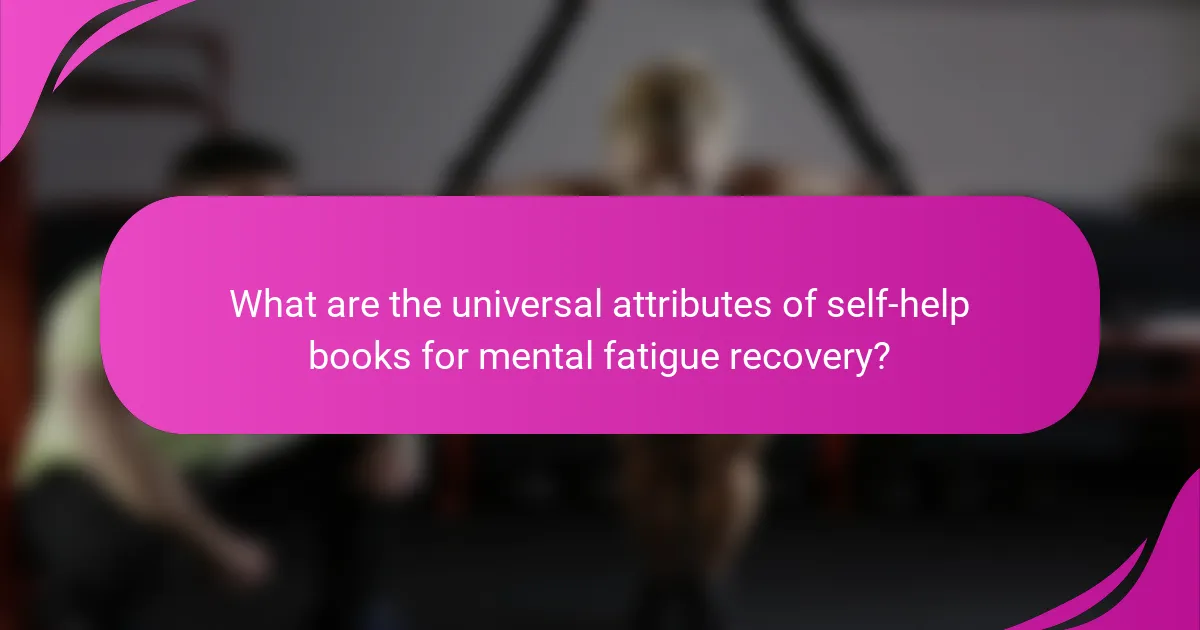
What are the universal attributes of self-help books for mental fatigue recovery?
Self-help books for mental fatigue recovery emphasise practical strategies, motivation, and mental resilience. Key attributes include actionable techniques, relatable anecdotes, evidence-based practices, and tailored advice for athletes. These books often focus on enhancing mental clarity, fostering self-compassion, and promoting effective recovery methods. They aim to empower women athletes by addressing unique challenges and providing tools for sustained mental health.
How do these books typically structure their content?
Self-help books for women athletes typically structure their content around practical strategies and actionable insights. They often include sections on mental fatigue management, recovery techniques, and personal anecdotes from successful athletes. Each chapter usually focuses on a specific challenge or theme, providing exercises, reflections, and case studies to enhance understanding. Many books also incorporate expert advice and research findings to support their recommendations, making the content relatable and evidence-based.
What common techniques are recommended across various titles?
Self-help books for women athletes often recommend techniques such as mindfulness, visualization, and goal-setting. Mindfulness helps manage stress and mental fatigue, while visualization enhances performance by mentally rehearsing success. Goal-setting provides direction and motivation, fostering resilience during recovery. These techniques collectively support mental well-being and athletic performance.
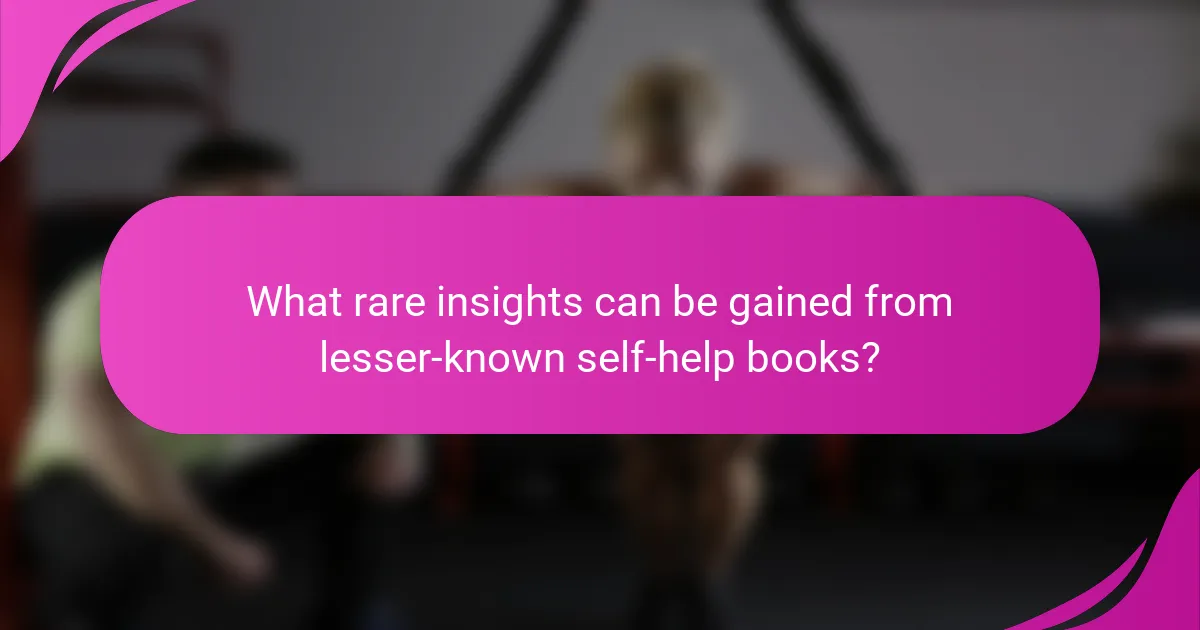
What rare insights can be gained from lesser-known self-help books?
Lesser-known self-help books can provide unique strategies specifically tailored for women athletes facing mental fatigue. These books often explore unconventional methods for enhancing recovery, such as mindfulness practices and emotional resilience techniques. Insights from these texts may include personalised approaches that prioritise mental well-being alongside physical training. By focusing on rare attributes like community support and holistic health, these resources empower athletes to tackle challenges uniquely, fostering a deeper understanding of their mental landscape.
Which unconventional methods are suggested for mental recovery?
Self-help books for women athletes suggest unconventional methods like mindfulness practices, creative expression, and nature immersion for mental recovery. These approaches enhance emotional resilience and promote relaxation, addressing mental fatigue effectively. Mindfulness techniques, such as meditation, have shown to reduce stress levels significantly. Creative activities, like journaling or art, can provide therapeutic benefits by allowing self-reflection. Spending time in nature has been linked to improved mood and cognitive function. Integrating these methods can lead to a holistic recovery strategy for women athletes.
How do personal stories in these books enhance relatability?
Personal stories in self-help books for women athletes enhance relatability by showcasing shared experiences and emotions. These narratives create a connection, allowing readers to see themselves in the author’s journey. Personal accounts of overcoming mental fatigue and enhancing recovery resonate deeply, making the advice more applicable. As a result, athletes feel understood and motivated to apply the strategies presented. This unique attribute of storytelling fosters a supportive community, encouraging women athletes to confront their challenges with resilience.
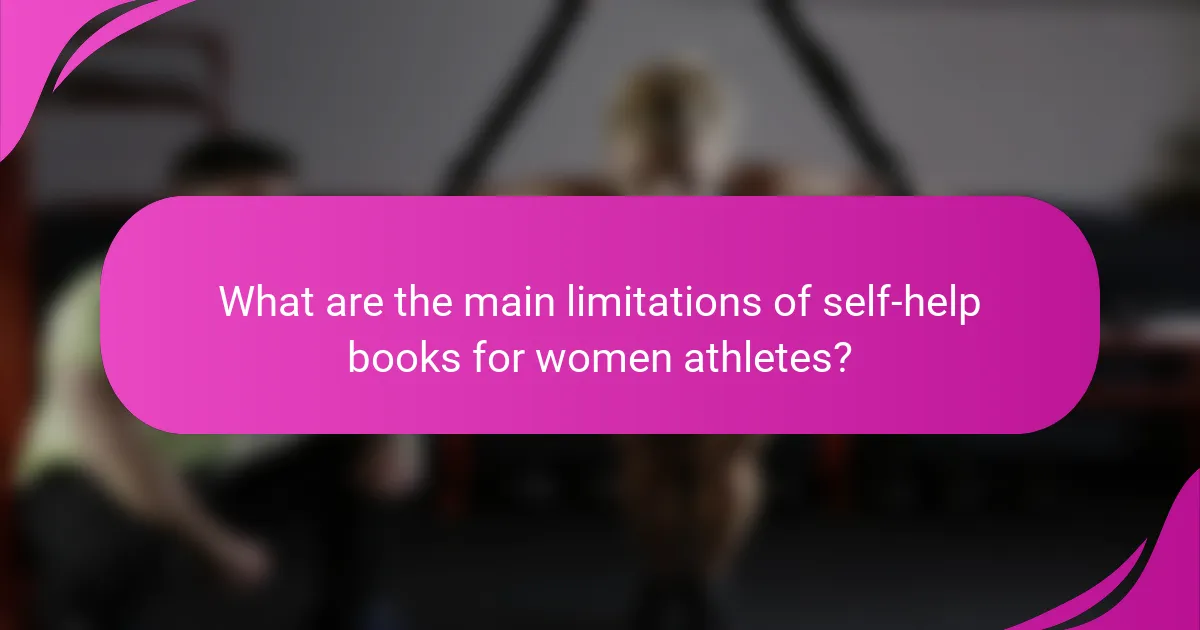
What are the main limitations of self-help books for women athletes?
Self-help books for women athletes often lack personalised strategies and may not address specific mental health challenges. They can oversimplify complex issues like mental fatigue and recovery, leading to frustration. Many do not incorporate recent research or evidence-based practices, making their advice less effective. Additionally, the generalisation of content may not resonate with diverse experiences among women athletes.
How can readers discern the effectiveness of different titles?
Readers can discern the effectiveness of different titles by analysing their clarity, relevance, and emotional appeal. Effective titles for self-help books for women athletes should clearly convey the focus on overcoming mental fatigue and enhancing recovery. Titles that use strong action words and relatable language resonate better with the target audience. Additionally, incorporating keywords like “overcoming” or “enhancing” signals the book’s purpose and benefits. Reviews and recommendations also provide insights into the title’s impact on readers’ experiences.
What should be considered when selecting a self-help book?
When selecting a self-help book, consider its focus on mental fatigue and recovery strategies tailored for women athletes. Look for books that provide evidence-based techniques, relatable experiences, and practical exercises. Unique attributes such as author credentials and reader reviews can enhance your choice. Additionally, evaluate the book’s structure, ensuring it offers actionable insights without overwhelming content.
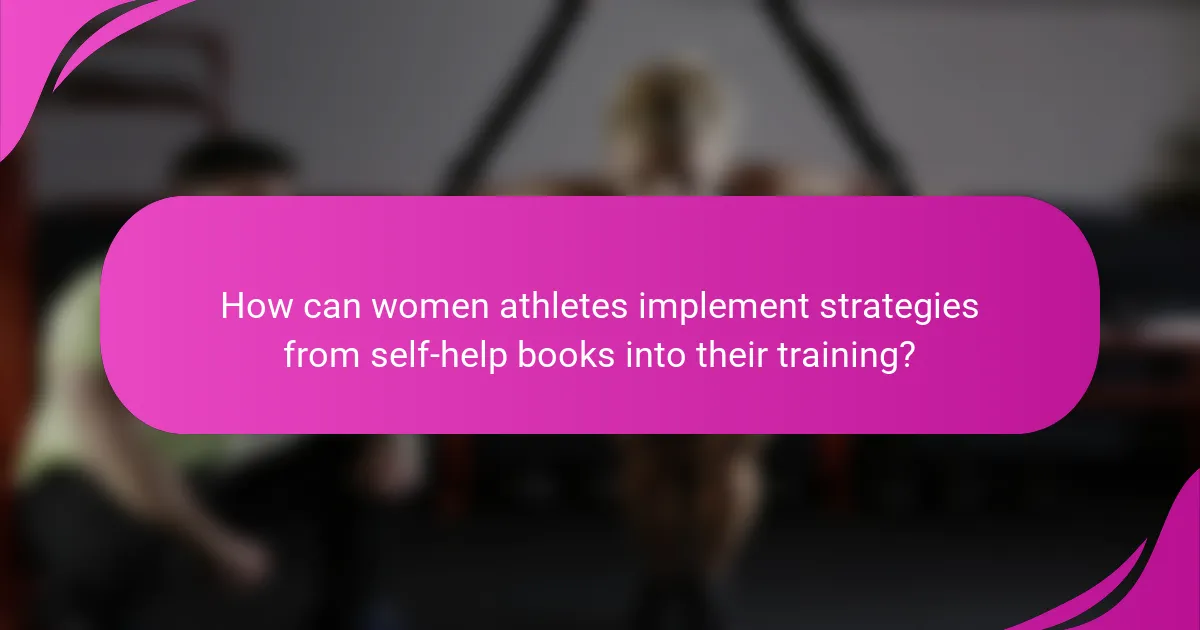
How can women athletes implement strategies from self-help books into their training?
Women athletes can effectively implement strategies from self-help books into their training by focusing on mental resilience and recovery techniques. These books often provide practical exercises that enhance focus, reduce anxiety, and improve overall mental well-being. Techniques such as visualization, positive affirmations, and mindfulness can be integrated into daily routines to combat mental fatigue. Additionally, self-help literature frequently emphasises the importance of rest and recovery, encouraging athletes to prioritise sleep and relaxation strategies. By adopting these principles, women athletes can enhance their performance and maintain a balanced approach to training.
What are the best practices for integrating recovery techniques into a training regimen?
Integrating recovery techniques into a training regimen enhances performance and mental resilience for women athletes. Prioritise techniques such as active recovery, mindfulness practices, and structured rest days. Active recovery, like light jogging or yoga, promotes blood flow and reduces muscle soreness. Mindfulness practices, including meditation, help in managing mental fatigue and stress. Structured rest days allow the body to repair and rejuvenate, preventing burnout. Incorporating these techniques consistently leads to improved overall well-being and athletic performance.
What common mistakes should be avoided when applying these strategies?
Common mistakes include neglecting mental aspects, overtraining, and failing to set realistic goals. Women athletes often underestimate the importance of rest and recovery. They might also rely solely on physical training, ignoring mental strategies that enhance performance. Additionally, seeking support from peers or professionals can be overlooked, limiting growth. Prioritising holistic approaches is essential for overcoming mental fatigue effectively.
What expert insights can enhance the application of self-help principles?
Expert insights can significantly enhance self-help principles for women athletes by focusing on mental resilience and recovery strategies. Techniques such as visualization, mindfulness, and cognitive restructuring can combat mental fatigue. Research indicates that athletes who incorporate these practices experience improved performance and quicker recovery times. Engaging with supportive communities and seeking mentorship also fosters a positive mindset. These approaches not only empower athletes but also create a sustainable framework for long-term mental health and athletic success.